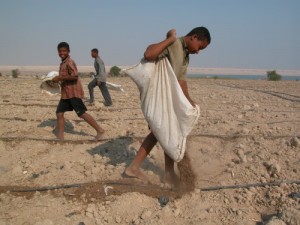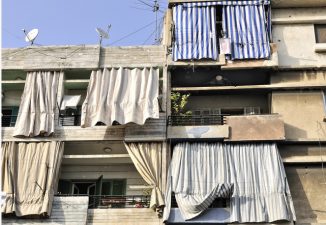 Hotter summers, intense irrigation and threats of losing their Nile, Egyptians are under quota for water compared to other Arab nations. They take to the streets.
Hotter summers, intense irrigation and threats of losing their Nile, Egyptians are under quota for water compared to other Arab nations. They take to the streets.
Looking at Google Earth (above) truly shows how Egypt is a fertile crescent of the region. But in the face of losing water from the Nile, tens of thousands of people in Egypt – Africa’s second most populous country – have taken to the streets in recent months to protest against water shortages. This goes some way to explaining the government’s reluctance to relinquish its current share of River Nile water.
On 26 July, 600 people from the southern governorate of Minya staged a sit-down protest outside the Irrigation Ministry in Cairo to protest about the lack of water for their land. While there have been water shortage protests in previous years, the size and frequency of protests in 2010 has been unprecedented, local observers say. “Water scarcity will be even worse in the future,” Riad Aldamk, head of a water studies project at Cairo College of Engineering, told IRIN, the United Nation’s environment news source.
He said Egypt’s total water consumption had increased by 17 percent in the last five years, according to studies conducted by the college. Hotter summers were partly to blame.
A recent report by the state-run Central Agency for Public Mobilization and Statistics (CAPMAS) said annual water resources would decline by 15.2 billion cubic metres by 2017 – from a required 86.2 billion cubic metres to a projected 71.4 billion cubic metres. The report said Egypt, where average per capita consumption was 700 cubic metres of water a year – was one of 15 Arab countries under the global water scarcity mark of 1,000 cubic metres per capita. The global average is 6,750 cubic metres per person annually.
Experts say agriculture is responsible for 70 percent of consumption and blame traditional irrigation methods for the loss of 8-17 billion cubic metres of water a year. Rice farms use much of our water, said Khalid Alqady, a professor of agriculture at Helwan University. “To grow rice, you need huge amounts of water.”
In response, the Agriculture Ministry is reducing the amount of land used to grow rice from 486,000 hectares in 2009 to 456,720 hectares this year. Alqady also blamed a proliferation of fish farms for water scarcity.
Egypt’s top 10 water-scarce areas:
This summer is a particularly hot one, aggravating the shortages. Based on interviews with several local water experts, IRIN highlights 10 areas particularly badly affected by water shortages.
Ismailia city – Water scarcity in this coastal northeastern city of some 750,000 has led to large-scale protests in recent weeks by farmers who say they can no longer irrigate their farms. The farmers urged the governor to help and invited TV cameras to record their predicament. They said drought had caused a shortage of irrigation water and that this had already made 57,803 hectares of farmland uncultivatable.
Dakahlia Governorate – Protests by farmers about scarce irrigation have become common in this agricultural area northeast of Cairo. Farmers, who regularly stage protests outside the office of the governor, say 10,789 hectares of farmland was no longer viable because it had received no irrigation for more than 24 days.
Kafr al-Sheikh Governorate – Farmers in al-Tarzy village, about 180km north of Cairo, said three weeks ago that irrigation water had stopped reaching their farms for 10 days. They have been holding protests, saying the lack of water was causing their crops to die but the government was doing nothing.
Sharqia Governorate – Insufficient irrigation has ruined hundreds of hectares of farmland, particularly in the northern part of this city 80km northeast of Cairo. Over the past month, water scarcity has forced rice farmers to use sewage water to irrigate their dying crops.
Fayoum city – Water scarcity has caused widespread anger in this city, 130km southwest of Cairo. This has led to protests in areas around the city by farmers, who say influential landowners with political connections receive whatever water is available, while the poor are left with nothing.
Damietta city – Scarce water has taken its toll on farmland in this northeastern coastal city and on the health of residents, who have been affected by water contaminated with sewage.
Marsa Matrouh city – A canal bringing water from the Nile to this northwestern coastal town recently dried up, causing drought and hardship for residents.
Minya Governorate – Rising temperatures have increased demand for water in this southern governorate. They have no piped water because of shortages.
Beni Suef city – Farmers in this city about 115km south of Cairo took to the streets two weeks ago because of a lack of irrigation water. They said 1,660 hectares of farmland had been rendered unusable.
Alexandria Governorate – Thousands of hectares of farmland in Nubaria village, south of Alexandria city, are set to dry up because the local authorities have been forced to heavily restrict irrigation.
Read more on the Nile:
12 Million Egyptians to be Affected By Climate Change
How Ancient Civilizations in the Middle East Depended on Water
Pick Organic Cotton From Under the Nile
::IRIN




There is NO excuse for growing rice or cotton there, especially since doing so requires huge amounts of subsidized water deliveries. Of course the growers will resist change, because it’s the source of their wealth, but it’s Egypt’s poison as it loses water to the nations that are the source of the Nile’s water.
There are other cash crops that can be grown. Egypt needs to force the changeover without delay.
Consult history and you will blame Moslem domination, not global warming. Conquest turned the most civilized culture ever based on the paradise like environments into a big desert sandbox, over a millenia. It is not a theological but a good government issue where many despots have ruined the landscape and underserved the people into desertification.
The Middle East needs to follow the evironment rebuilding programs of Israel and forget about the empty promise of global climate changers and teir specious C
O2 remedies.